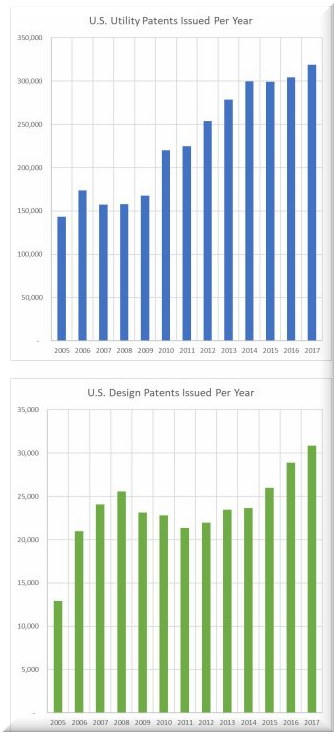Declining patent quality means more patents, i.e. more income for the patent microcosm

Credit: Dennis Crouch
Summary: Noting the correlation between quality of patents and patent trolls, which typically rely on software patents and attempt to drag every legal dispute to the Eastern District of Texas
Timothy B. Lee, who had spent several years writing about the harms of software patents and other aspects of the USPTO, published an article stating that "experts figured out why so many bogus patents get approved". "If you've read our coverage of the Electronic Frontier Foundation's "Stupid Patent of the Month" series," he said, "you know America has a patent quality problem. People apply for patents on ideas that are obvious, vague, or were invented years earlier. Too often, applications get approved and low-quality patents fall into the hands of patent trolls, creating headaches for real innovators."
We are going to write about "Stupid Patent of the Month" later this weekend; the EFF sure attracted a lot of media attention, raised the issue of patent quality, and angered many patent trolls. There has certainly been a patent bubble in the USPTO; innovation is not soaring, it's just 'patentism'. More and more domains are becoming plagued or infested with patents. The same is true at the
EPO, which now grants patents on life. To demonstrate this patent bubble -- willingly or
unwillingly -- Crouch has
produced this graph/chart which he explains as follows:
After a couple of years of stagnant growth, the USPTO has issued record numbers of both utility and design patents in 2017. (Charts below). The number of new utility applications is down over the past couple of years (excluding continuations and CIPs). Rather than being due to more inflow, the rise in issuance can be explained primarily by an increased issuance rate as well as efforts to reduce “rework.”
What the chart basically shows is constant growth in the number of patents. Is this really desirable? Well, when one is in the business of patents (lawsuits etc.), then yes... it's desirable. But at whose expense? Many companies and even trolls now sue with bogus patents, at times driving legitimate businesses into bankruptcy.
Thankfully, in several areas and
notably in the software domain, the USPTO is making improvements. Not only patent quality is sometimes being improved; forum shopping, burden of legal fees etc. get challenged, owing primarily to the Supreme Court. Here's a
new example of attorney fee award. What we have here is assertion of bogus patents causing or costing a great deal to the plaintiff:
Following dismissal for lack of patentable subject matter, the court granted defendants' motions for attorney fees under 35 U.S.C. ۤ 285 because plaintiff's litigation positions were unreasonable. "Patient treatment and monitoring methods such as those claimed by the [patent-in-suit] had been declared ineligible long before [plaintiff] filed its 2016 lawsuits. . . . The numerous cases invalidating claims directed to information collection and analysis, such as the [patent-in-suit's] claims, stood in stark contrast to the handful of cases reaching the contrary conclusion. . . . There were of course gray areas, but by the time [plaintiff's] lawsuits were filed, it should have been clear that the [patent's] claims were 'manifestly directed to an abstract idea.'. . . The weakness in [plaintiff's] ۤ 101 position is by itself a sufficient basis for finding the cases exceptional."
Well, ۤ 101 is about abstractness. And what we have here is an Eastern District of Texas case initiated by a troll called My Health. As
another site put it, the "magistrate judge's Memorandum and Order sets forth a history of My Heath's [sic] patent assertion history..."
Trolling history.
Here's
another similar new case, albeit with an opposite outcome: (almost identical text; it's
the patent troll Uniloc trolling Amazon in the Eastern District of Texas):
Following dismissal for lack of patentable subject matter, the court denied defendants' motions for attorney fees under 35 U.S.C. ۤ 285 because plaintiff's litigation positions were not baseless.
When trolls like Uniloc are finally (belatedly) compelled to compensate for their
innocent victims' damages the trolls will be dismantled. But until then (if that ever happens) we need to work to ensure that such trolls haven't such patents in the first place; as long as they do, they can either pick on small companies for 'protection' money or initiative frivolous litigation at any time.
⬆

